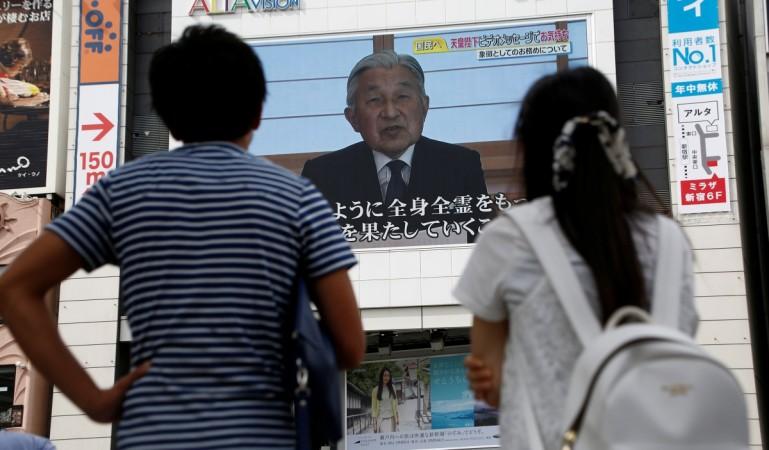
Emperor Akihito of Japan hinted about abdicating his position citing health issues in a televised 10-minute address to the nation. The 82-year-old monarch talked about his age and physical limitations during his first public address over abdication.
"When I consider that my fitness level is gradually declining, I am worried that it may become difficult for me to carry out my duties as the symbol of the state with my whole being, as I have done until now...There are times when I feel various constraints such as in my physical fitness," he said.
He also said that appointing a regent to carry out the duties of the emperor was out of the question. Even if a regent was appointed the emperor retains his title until the end of his life.
"It is conceivable that a regent could be appointed," he said.
The monarch, who is part of the world's oldest hereditary monarchy, said that he wanted a family succession, implying that he wants to pass the throne to his 56-year-old son. This is something unheard of in the Japanese monarchy, since the Constitution does not have a provision for the reigning emperor to step down from the position.
The octogenarian has been treated for prostate cancer and has undergone a heart surgery. The public broadcaster NHK had said in July that Emperor Akihito wants to step down in a few years.
The royal family in Japan has no political role and is a symbol of the "unity of the people."
The Chrysanthemum Throne was taken up by Akihito in 1989 after the death of his father, Emperor Hirohito, who had to relinquish the divinity after Japan lost during the WWII in 1945. The royal family until then had been spearheading campaigns of conquest across Asia.
Currently, the Japanese Constitution says that the emperor is a "symbol of the state and the unity of the people, deriving his position from the will of the people with whom resides sovereign power." He can't intervene in the country's politics, which is what a call for abdication can be perceived as. His responsibilities include receiving foreign dignitaries, awarding decorations to Japanese citizens, convening the Diet (National Assembly), and officially appointing the Prime Minister as selected by the Diet.
Japan's Prime Minister Shinzo Abe said that the government would consider the emperor's abdication and that his comments have been taken into account "seriously," according to BBC.
Tokyo residents watch #Japanese Emperor #Akihito give 2nd televised address ever. Discussing his age, health, future pic.twitter.com/Tl8BNOKURA
— Will Ripley (@willripleyCNN) August 8, 2016
Japan's emperor Akihito has carefully parsed his words, making clear he wants to retire while not being "political" pic.twitter.com/DLp3MPc0fX — Anna Fifield (@annafifield) August 8, 2016

















